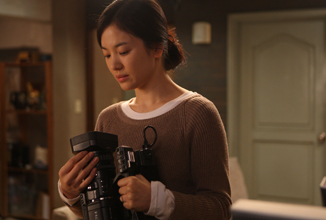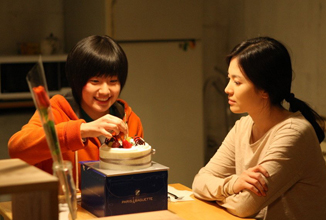"Todayis the next day those who died yesterday were desperate to have...'"
Synopsis:
It has been almost a year since Da-hye's (Song Hye-kyo) boyfriend, Sang-ho (Song Chang-ui), was killed in a road accident and she has already been convinced by church leaders to sign a "forgiveness petition" allowing the culprit of the crime to be released early from prison.
Commissioned (also by the church) to make a documentary to encourage others to sign similar petitions, Da-hye begins to interview various victims of violent crimes, helped by teenage abuse victim Ji-min (Nam Ji-hyun), sure in the knowledge that she is doing, and has done, the right thing.
However, as her interviews continue Da-hye is increasingly faced with the realisation that none of those she speaks to who have forgiven criminals and signed petitions have been able to find peace as a result or move on with their lives, and she finally decides to find out what happened to the man responsible for Sang-ho's death to ascertain if he is living as miserably as she is, and if not why not...
Review:
Alexander Pope, English poet & satirist, famously wrote "To err is human, to forgive divine" in his poem 'An Essay on Criticism, Part II', but can any of us say with certainty that we would be able to find it in our hearts to truly forgive someone who was responsible for the death of a loved one, and if we did would we later question that decision (even putting our faith to the test) if we were to discover that the guilty party feels no remorse for their crime and/or has committed other vicious acts since?
As we join A Reason to Live, Da-hye has already signed a "forgiveness petition" for the young motorcycle driver who knocked down, subsequently ran over and killed her boyfriend almost a year ago and she is currently in the process of filming various victims of violent crime or their families for a church documentary on the importance of forgiveness for crime victims and culprits alike, but as she listens to the painful stories of lives shattered and hopes and dreams destroyed she finds it increasingly difficult to rationalise her decision to forgive a man who has seemingly all too easily put Sang-ho's murder behind him and carried on with a life of violence, while she has remained in unending abject misery.
While A Reason to Live, on the surface, follows Da-hye's journey to discover and understand her true feelings; find a way to move on with her life and ultimately allow herself to grieve, it also uses this main character arc to dissect religious faith itself and ask to what extent a forgiving "turn the other cheek" mentality can ever be expected to alleviate the pain of loss or allow a broken heart (and life) to mend.
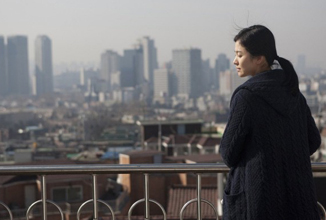 |
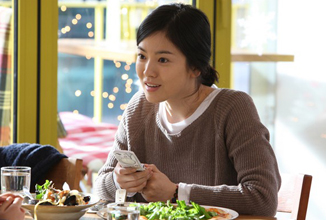 |
The sub-plot of the brutal abuse suffered by teenager Ji-min at the hands of her father (a respected judge); her utter inability to forgive; and the eventual assertion that her internalisation of her pain is, at least in part, responsible for her illness (subconscious self-destruction rather than the destruction of others, if you will) initially shows a perspective that is the polar opposite to Da-hye's, but as the two women bond and begin to understand each other, A Reason to Live increasingly implies that perhaps their beliefs and perceptions are not as different as they initially appeared to be.
However, director Lee Jeong-hyang's understated directorial style which served some of his earlier work so well (namely, the gentle funny Art Museum by the Zoo and the wonderful The Way Home) in this case combines with the multi-layered narrative to cause proceedings to drag somewhat on more than one occasion as well as meandering in drawing the various threads together to their ultimate conclusion. It does also have to be said that the end point of the story is overly predictable (that's a massive understatement, by the way) and though the climax of proceedings attempts to include a deliberate ambiguity, ambiguous it is not in any respect.
Not only that, but while A Reason to Live should be commended for trying to cover so many fairly serious and even philosophical issues - religion, faith, coercion to fit into social norms, human rights, bias of the state in (almost) favour of the guilty, and even the guilt inherent to grief - the detailing of such a myriad of themes and sub-plots is frankly a dangerous game to play. Sadly, A Reason to Live utilises a too many clichés, overused plot devices and cinematic elements to do so - not least, a main character with a likely terminal illness; outward personas hiding deep rooted pain who are unable to move on as a result; and the repeated use of copious flashbacks - feeling rather contrived as a result and ultimately falling long before the final hurdle.
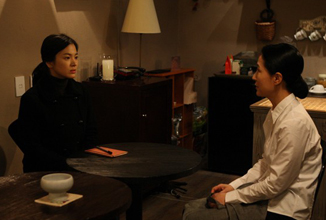 |
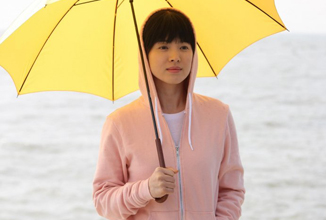 |
Though the repeated assertion that the legal system is geared far more towards the rights of the guilty than those of their victims and Da-hye's discovery that none of those who have signed forgiveness petitions have in any way found lasting peace or moved on with their lives are understandable (if again predictable) plot points, the one narrative thread that is, to my mind, frankly unbelievable is that of Da-hye's reaction to Ji-min's abuse. Ok, so family is, even today, an incredibly important aspect of Korean culture, but for someone as focused on doing the morally correct thing as Da-hye claims to be (and especially considering her considerable understanding of human pain) the fact that she is fully aware of the extent of Ji-min's abuse yet repeatedly states "They're your family, so you should be grateful to them" really doesn't ring true.
While it's clear that Da-hye is trying to teach Ji-min how to understand and forgive, surely Ji-min's forgiving her father would only really be viable if the abuse had already ended and not while it's still going on and unlikely to cease.
Certainly it's likely that part of the reason for this aspect to be included was to underline Da-hye's slowly changing feelings about the concept of forgiveness but even with that being the case Da-hye is so wrapped up in her own journey that her changing feelings of the treatment of Ji-min are ultimately rather glossed over, apart from a single argument with Ji-min's brother. However, even here Da-hye brings that conversation quickly back to her own grief, pain and allocation of blame and the plight of Ji-min is largely set aside yet again.
A Reason to Live is almost bereft of musical accompaniment save for a handful of brief appearances in the most emotional moments (each lasting for less than a minute) and while this serves to underline the documentary feel of proceedings, when the music does feature it stands out conspicuously by its easier absence and sadly pulls viewers out of their immersion in the story - almost screaming "this is a poignant, heartbreaking moment" in the process. Ultimately, the few "tearful" moments are largely tearless from a viewer's point of view, in spite of any attempted musical coercion and while, for the most part, the avoidance of out-and-out melodramatics throughout the majority of the narrative is a rare step outside the norm, it sadly combines with this to result in proceedings often seeming rather dull.
Finally, in recent years, there have been increasing numbers of Korean films dealing with similar themes of religion and forgiveness but, of all these, A Reason to Live has been most compared to and contrasted with Lee Chang-dong's Secret Sunshine, both in the press and larger media. However, while the two films are undeniably thematically similar, their depictions are frankly poles apart and I truly believe that referencing the work of one of the greatest Korean directors (in my opinion, Lee Chang-dong can do no wrong) can achieve nothing but an underlining of the fact that A Reason to Live is the loser of the comparison, at every available turn.
Summary:
While A Reason to Live should be commended for its attempt to dissect so many serious social, and even philosophical, issues within its narrative, its overuse of rather predictable clichés, contrived plot catalysts and its somewhat laboured pace detract from what would otherwise have been a worthy, cerebral story.
Cast: Song Hye-kyo, Song Chang-ui, Nam Ji-hyun, Ki Tae-young
Directed by: Lee Jeong-hyang
DVD
The DVD
edition reviewed here is the Korean (Region 3) Eos Single Disc release. The film itself is
provided as an anamorphic transfer with an aspect ratio of 1.85:1 and there are no image artifacts (and no ghosting) present.
The original Korean
language soundtrack is provided as Dolby Digital 5.1 and is clear and well balanced in spite of the lack of musical score.
Excellent subtitles are provided
throughout the main feature but English-speaking viewers should note that, as with many Korean DVD releases, there are no subtitles available on any of the extras.
DVD Details:
• Director: Lee Jeong-hyang
• Format: NTSC, Anamorphic, Widescreen, Subtitled
• Language: Korean
• Subtitles: English/Korean
• Sound: Dolby Digital 5.1
• Region: Region 3
• Aspect Ratio: 1.85:1
• Number of discs: 1
• Studio: Eos
• Runtime: 120mins (approx.)
DVD Extras:
• 'Making of' Featurette
• 'Song Hye-kyo Character Image' Featurette
• 'Supporting Actors' Featurette
• Film 'Bow'
• VIP Premiere
• 'Poster Shooting' Featurette
• Production Reporting
• 'Meeting' Featurette
|


